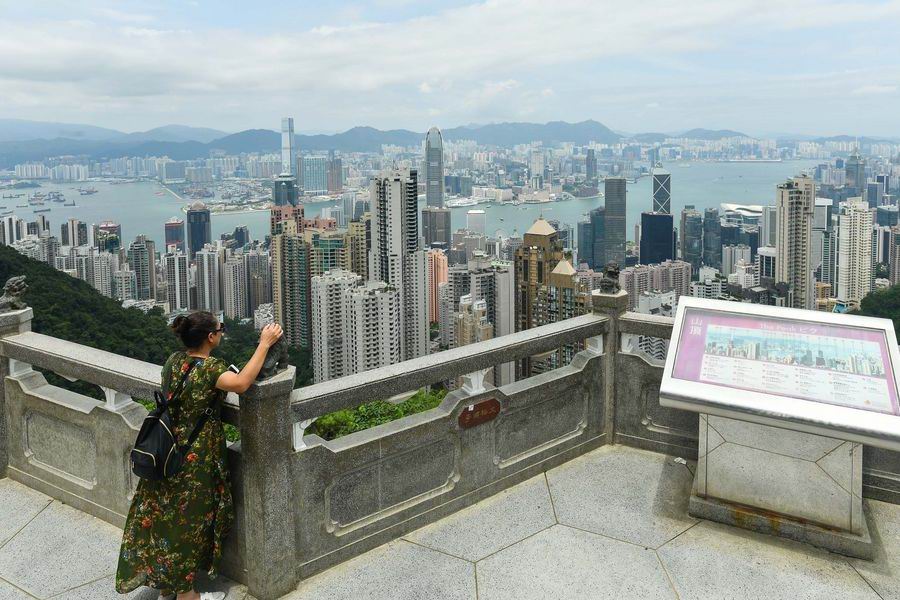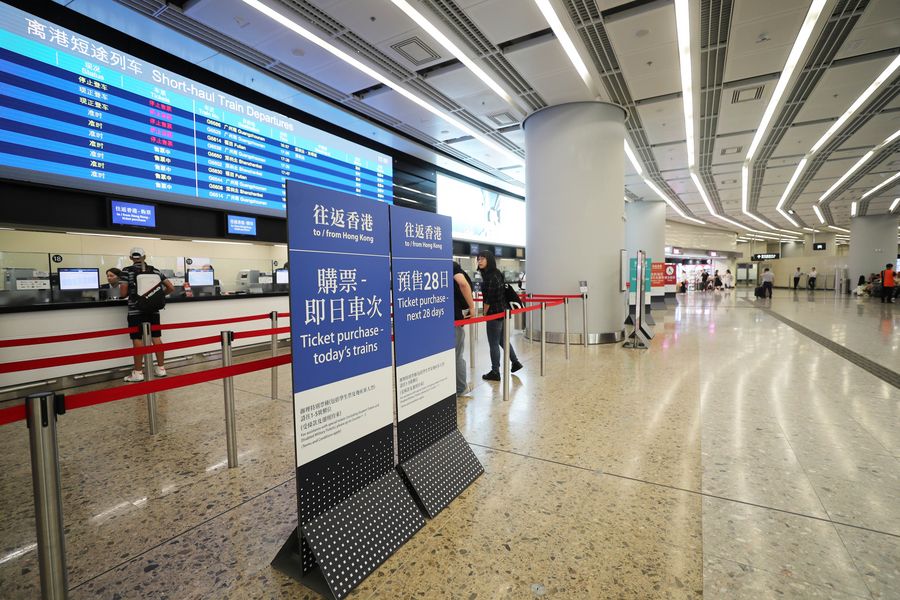
A tourist visits the Peak Hong Kong scenic spot in south China's Hong Kong, Aug. 20, 2019. (Xinhua/Liu Dawei)
"For us in the tourism sector, now is like SARS, and even worse," said Leung Fong-yuen, chairwoman of the Hong Kong Tourism Industry Employees' General Union, who witnessed how the prolonged violence scared away visitors, pushing many in the trade to the brink of survival.
The past four months proved particularly hard for tour guides in Leung's agency, with their incomes whittled down 90 percent year-on-year. An earlier survey showed Hong Kong's tourist practitioners earned 80 percent less between June and August, and one in every 10 had no income at all.
by Xinhua Writers Yao Yuan and Zhu Yuxuan
HONG KONG, Oct. 18 (Xinhua) -- Watching black-clad rioters turning Hong Kong streets into chaos and desolation, Leung Fong-yuen felt like reliving the horror when the metropolis was gripped by the SARS pandemic in 2003.
"For us in the tourism sector, now is like SARS, and even worse," said Leung, the chairwoman of the Hong Kong Tourism Industry Employees' General Union, who witnessed how the prolonged violence scared away visitors, pushing many in the trade to the brink of survival.
At the peak of the four-month SARS outbreak, there were days when the numbers of tour groups plunged to zero, but it did not last long, she recalled. Moreover, after the retreat of the epidemic, individual travellers from the mainland were allowed to Hong Kong to speed up the recovery of local tourism.
But as the unrest now rages into its fifth month, Leung is not so optimistic.
When Leung, also a tour guide herself, recently went to the mainland and Southeast Asia to promote their study tours, most parents demanded Hong Kong be removed from the tours that also included nine mainland cities and the Macao Special Administrative Region, citing safety concerns.
"Despite the grim situation in 2003, we could see light at the end of the tunnel. But now the tourism industry is facing a man-made disaster, and there is no prediction when the violence will stop," she said.
Leung is one of the 270,000 practitioners in Hong Kong's tourism sector, which is a major employer in the Asian financial hub and among the hardest hit by the months-long unrest.
The turbulence was sparked in June by proposed ordinance amendments concerning fugitives' transfers. Although the government of Hong Kong Special Administrative Region (HKSAR) decided to withdraw the amendments in September, violence continued as protesters raised the ante, and peaceful rallies frequently turned violent after radicals blocked roads, vandalized shops and assaulted people who held different views.
So far, over 40 countries and regions have issued traveling advisories for Hong Kong. The tension also forced Hong Kong to cancel a number of festive and cultural events popular among tourists, from National Day fireworks display to Hong Kong Wine & Dine Festival.
Statistics show Hong Kong's visitor arrivals in August dipped by nearly 40 percent year-on-year. The malaise continued into this year's National Day holiday starting on Oct. 1 in the mainland, with the otherwise tourist "Golden Week" in Hong Kong registering a 50-percent decline in visitor arrivals.
Leung said their main clients -- package tourists -- have largely evaporated. Before June, there were on average 300 to 500 tour groups from the mainland every day. The figure is now fewer than 10.
The past four months proved particularly hard for tour guides in Leung's agency, with their incomes whittled down 90 percent year-on-year. An earlier survey showed Hong Kong's tourist practitioners earned 80 percent less between June and August, and one in every 10 had no income at all.
"Many of us are scraping with savings, and some who had no work at all went to live with relatives in the mainland to cut the cost of living," she told Xinhua.
Tang Ning, a Japanese-language tour guide, also testified to the predicament. "Many of our Japanese clients abandoned Hong Kong and switched to Singapore and Thailand."
Tang stayed idle most of time in October, and among the few Japanese tourists he received, many "had no choice but to come" as their trips were booked months ago and could not be canceled.
"I'm lucky enough to enjoy fixed salaries, but now I fear that my company may go bankrupt if the bad situation continued, and I will lose my job," he said.
The convulsion is not just felt by tour guides. With fewer tourists, hotel occupancy fell 28 percent year-on-year in August and total retail sales went down 23 percent. HKSAR Chief Executive Carrie Lam said Hong Kong is considered to have slipped into a technical recession since the third quarter.
"We tourist practitioners are a hardy group of people. When work was scarce, we used to eke out a living with odd jobs. But now the whole job market is sluggish, and there aren't many jobs for us," Leung said. "We're literally on the verge of starvation."

Photo taken on Oct. 2, 2019 shows the West Kowloon high-speed railway station in Hong Kong, south China. (Xinhua/Lu Ye)
Leung said her union, while denouncing the rioters' violence, has asked for assistance from the government and from the society to tide over the "particularly difficult time."
In response the HKSAR government has promised a raft of supportive measures, including skill training, funding and loan schemes, and waiving of tour guide licence fees, to help revive the tourism industry.
Industry associations in Hong Kong have joined the chorus of condemning violence. The Hong Kong General Chamber of Commerce recently issued a strongly-worded statement, saying the radicals' disruptive acts are crippling many small businesses and threatening the livelihoods of hundreds of thousands of ordinary citizens.
However, their voices were often overwhelmed by protesters' demands in media reports and social media.
"I do not understand why some people choose to condone violence. Without tourists, Hong Kong will be a ruin," Leung said.
"Some left messages on our website calling for us to made sacrifice, but the society is closely intertwined, and sectors like tourism, catering, retailing, hospitality are interdependent," she said.
"Tourism is the first domino to fall in the prolonged violence, and the jobs of those who ask for our sacrifice are yet to be hit."■



